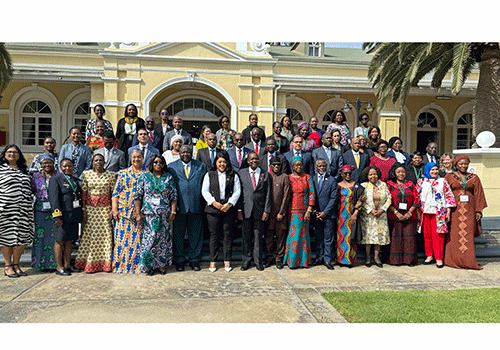SWAKOPMUND – Namibia stands as a testament to the resilience and strength of its women, who have been instrumental in shaping the narrative of peace and reconciliation.
Thus, governments and inter-governmental organisations should create an impetus for United Nations Security Council Resolution 1325, (UNSCR 1325) and allocate resources to programmes that address its provisions.
This is according to the minister of foreign relations, Peya Mushelenga who was speaking at the opening of the African Union high-level seminar on Women, Peace, and Security (WPS) that took place in Swakopmund on Saturday. The high-level seminar was held under the theme: “Commemorating 20 years of the Peace and Security Council (PSC) by taking stock of women’s participation and leadership in peace processes in Africa”.
UNSCR 1325, adopted by the United Nations Security Council in October 2000, is a landmark resolution aimed at addressing the disproportionate impact of conflict on women and promoting their participation in peace and security processes.
The resolution emphasizes the importance of recognising the critical role of women in conflict prevention, resolution, and peacebuilding.
However, Mushelenga says the issue of women in peace and security has become a subject of debate, in respect of implementing the provisions in the UNSCR 1325.
“The publication New Directions in WPS states that failures of implementation result from a lack of resources, lack of political will, and the lack of understanding about the ‘true’ women in peace and security principles that ought to be prioritized and thus operationalised,” Mushelenga stated.
He added that Africa should demonstrate the will and zeal in the continent’s actions and bring women to play meaningful roles as titans in the front row of peace-making efforts and programmes. Mushelenga explained that it is a known fact, that women have increased skills in peacebuilding, activism, and formal recognition of their important role and contribution in the search for lasting peace, stability, and development. “However, more needs to be done on women’s meaningful participation in formal peace processes. The AU Agenda 2063 under UN Sustainable Development Goals demand better and more meaningful participation of women and integration of gender perspectives into peace and security initiatives. This is simply because women’s participation is intrinsically linked to sustainable development, overall peace, more secure and peaceful societies,” he appealed.
Also speaking at the opening of the high-level seminar, Parfait Onanga-Anyanga, the UN Special Representative of the Secretary General of the AU and head of the United Nations Office in the AU, applauded the commitment made by African leaders and the AU towards advancing the WPS Agenda in Africa. “The United Nations welcomes the decision taken in 2010 by the PSC to have a standing session on Women, Peace, and Security (WPS) every year, as an annual reflection on the state of implementation and domestication of this important agenda across the continent,” he said.
According to him, this important decision helped ensure that a gender-sensitive approach to peace and security in Africa is fully integrated, in line with the United Nations Security Council Resolution 1325 and the Maputo Protocol. Onanga-Anyanga further said women’s full, equal, and meaningful participation in all efforts to build sustainable peace is at the heart of more than two decades of global commitments towards advancing the women, peace, and security agenda.
“Women have played – and continue to play – vital roles, albeit often behind the scenes, in mediating conflicts and reducing tensions in and between communities,” he noted.
-edeklerk@nepc.com.nax


